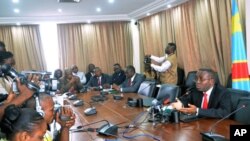The new prime minister of the Democratic Republic of Congo, Matata Ponyo Mapon, has named the ministers who make up his new government. Political observers say the new team contains more technocrats and fewer politicians, but also does not include any members of the opposition.
When he was appointed by President Joseph Kabila last week, Ponyo promised not to have a jumbo-sized government. He followed through on his pledge, naming a government with 36 ministers compared to more than 60 in the previous administration.
Only seven members of the previous government retained their posts. And, in a notable change, this Cabinet includes fewer heads of political parties and others who have made a name for themselves in politics. Many of the new ministers are unknown to the public, and likely have been chosen for their technical and managerial experience.
A political analyst at the University of Kinshasa, professor Philippe Buyoya said that having fewer heads of political parties means ministers can concentrate more on running the country, rather than internal politics.
He said the choice of ministers shows that the president wants to have an administration that will govern, rather than just distribute the fruits of victory in the elections.
However, Buyoya notes that the new government is less politically diverse than the old one.
He said that compared with the previous government of Antoine Gizenga and Adolphe Muzito, this one is essentially a government of the ruling party, with other parties as allies but dominated by the ruling party, the PPRD.
Jean Claude Katende heads of one of Congo’s leading human rights organizations, ASADHO [African Association for the Defense of Human Rights]. He said he is disappointed that the new government is not more inclusive.
He said his organization is concerned that there are no members of the opposition in the new government, as the president appeared to have promised when he was sworn into office. Katende said that after the controversy surrounding the last elections, he thought it was necessary to include some opposition members in government.
Kabila won re-election in November but his challengers rejected the results, and observers noted significant disarray during the vote-counting process. The U.S.-based Carter Center suggested the true results of the parliamentary elections may never be known.
Over the weekend, Congo’s Supreme Court announced the final results of its investigations following legal challenges to the election results. After ruling on Wednesday that 32 members of parliament were not rightfully elected, the court confirmed the elections of the other MPs.
News
DRC Prime Minister Unveils Smaller Government
- By Nick Long




